Phylum porifera - Study guides, Class notes & Summaries
Looking for the best study guides, study notes and summaries about Phylum porifera? On this page you'll find 128 study documents about Phylum porifera.
Page 3 out of 128 results
Sort by
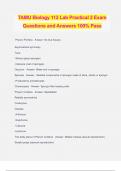
-
TAMU Biology 112 Lab Practical 2 Exam Questions and Answers 100% Pass
- Exam (elaborations) • 23 pages • 2024
-
- $12.49
- + learn more
TAMU Biology 112 Lab Practical 2 Exam Questions and Answers 100% Pass Phylum Porifera - Answer- No true tissues Asymmetrical symmetry Taxa: -Silicea (glass sponges) -Calcarea (rest of sponges) Osculum - Answer- Water exit in sponges Spicules - Answer- -Skeletal components of sponges made of silica, calcite or spongin -Produced by amoebocytes Choanocytes - Answer- Spong's filter-feeding cells Phylum Cnidaria - Answer- Diploblastic Radially symmetrical Cnidocytes Classes: -Anthozoa...
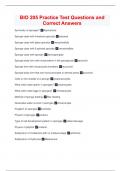
-
BIO 205 Practice Test Questions and Correct Answers
- Exam (elaborations) • 9 pages • 2024
-
Available in package deal
-
- $9.49
- + learn more
Symmetry of sponges? Asymetrical Sponge class with limestone spicules calcarea Sponge class with glass spicules hexactinellida Sponge class with 6 pointed spicules hexactinellida Sponge class with spongin demospongiae Sponge body form with choanoderm in the spongocoel asconoid Sponge form with choanocyte chambers leuconoid Sponge body form that can have porocytes or dermal pores syconoid Cells on the outside of a sponge exopinacocytes What cells make sperm in sponges? choanocytes What ...
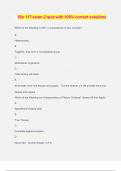
-
Bio 117 exam 2 quiz with 100% correct solutions
- Exam (elaborations) • 49 pages • 2024
-
- $13.49
- + learn more
Bio 117 exam 2 quiz with 100% correct solutions Which of the following is NOT a characteristic of ALL animals? A. Heterotrophic B. Together, they form a monophyletic group. C. Multicellular organisms D. Cells lacking cell walls. E. All animals have true tissues and organs. - Correct Answer ️️ -All animals have true tissues and organs. Which of the following are characteristics of Phylum Cnidaria? (Select All that Apply) A. Specialized stinging cells B. True Tissues C. Comp...
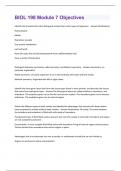
-
BIOL 198 Module 7 Objectives Questions & Answers Already Passed!!
- Exam (elaborations) • 19 pages • 2024
- Available in package deal
-
- $6.79
- + learn more
Identify the characteristics that distinguish animals from other types of organisms. - Answer-Multicellular Heterotrophic Motile Reproduce sexually Use aerobic metabolism Lack cell walls Have life cycles that include development from undifferentiated cells Have a variety of body plans Distinguish between asymmetry, radial symmetry, and bilateral symmetry. - Answer-Asymmetry: no particular organization Radial symmetry: Circularly organized. If cut in half vertically, the halves will loo...
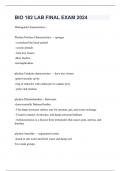
-
BIO 182 LAB FINAL EXAM 2024
- Exam (elaborations) • 11 pages • 2024
-
Available in package deal
-
- $13.99
- + learn more
Distinguish Characteristics - Phylum Porifera Characteristics - - sponges - considered the basal animal - sessile animals - lack true tissues -filter feeders -hermaphrodites phylum Cnidaria characteristics - - have true tissues -gastrovascular cavity -ring of tentacles with cnidocytes to capture prey - polys and medusa phylum Platyhelminthes - flatworms -dorsoventrally flattened bodies - Flat shape increases surface area for nutrient, gas, and waste exchange - Found in mar...
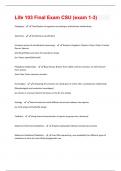
-
Life 103 Final Exam CSU (exam 1-3) Graded A Q&A Complete
- Exam (elaborations) • 15 pages • 2024
- Available in package deal
-
- $7.99
- + learn more
Phylogeny - Classification of organisms according to evolutionary relationships. Taxonomy - Evolutionary classification Linnaean system of classification (taxonomy) - Domain> Kingdom> Phylum> Class> Order> Family> Genus> Species (Did King Phillip Come Over For Grandma's Soup) [ex. Homo sapien](italicized) Phylogeny relationships - Basal Group: Branch from oldest common ancestor, no other branch from species. Sister Taxa: Share common ancestor Homologies - Comparing...
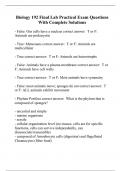
-
Biology 192 Final Lab Practical Exam Questions With Complete Solutions
- Exam (elaborations) • 33 pages • 2023
-
Available in package deal
-
- $12.99
- + learn more
- False: Our cells have a nucleus correct answer: T or F: Animals are prokaryotic - True: Metazoans correct answer: T or F: Animals are multicellular - True correct answer: T or F: Animals are heterotrophs - False: Animals have a plasma membrane correct answer: T or F: Animals have cell walls - True correct answer: T or F: Most animals have symmetry - False: most animals move; sponges do not correct answer: T or F: ALL animals exhibit movement - Phylum Porifera correct an...
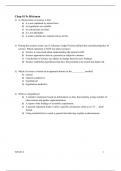
-
Test Bank for Animal Diversity, 9th Edition by Cleveland Hickman
- Exam (elaborations) • 272 pages • 2023
-
- $29.49
- + learn more
Test Bank for Animal Diversity, 9th Edition 9e by Cleveland Hickman, Jr., Susan Keen, Allan Larson, David Eisenhour and Larry Roberts. ISBN-13: 0887 Full Chapters test banks are included 1. Science of Zoology and Evolution of Animal Diversity 2. Animal Ecology 3. Animal Architecture 4. Taxonomy and Phylogeny of Animals 5. Unicellular Eukaryotes 6. Sponges: Phylum Porifera 7. Cnidarians and Ctenophores 8. Xenacoelomorpha, Platyhelminthes,Gastrotricha, Gnathifera, including Chaetognat...
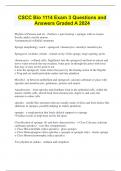
-
CSCC Bio 1114 Exam 3 Questions and Answers Graded A 2024
- Exam (elaborations) • 10 pages • 2024
-
- $14.49
- + learn more
Phylum of Parazoa and etc - Porifera = pore bearing = sponges with no tissues Sessile adults, mostly marine Asymmetrical or Radial symmetry Sponge morphology voacb - spongocel, choanocytes, mesohyl, amoebocytes Spongocel, osculum, ostium - central cavity of the sponge, large opening, pores choanocytes - collared cells; flagellated, line the spongocel and beat in unison and move water towards the top osculum; water goes in through the pores with food that may or may not be good to eat ...
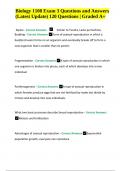
-
Biology 1108 Exam 3 Questions and Answers Latest Update | 120 Questions | Graded A+
- Exam (elaborations) • 21 pages • 2023
-
- $16.49
- + learn more
Biology 1108 Exam 3 Questions and Answers (Latest Update) 120 Questions | Graded A+. Alpine - Correct Answers Similar to Tundra, Lacks permafrost, Budding - Correct Answers Form of asexual reproduction in which a bud/protrusion forms on an organism and eventually breaks off to form a new organism that is smaller than its parent. Fragmentation - Correct Answers A type of asexual reproduction in which one organism is broken into pieces, each of which develops into a new individual Partheno...

$6.50 for your textbook summary multiplied by 100 fellow students... Do the math: that's a lot of money! Don't be a thief of your own wallet and start uploading yours now. Discover all about earning on Stuvia


